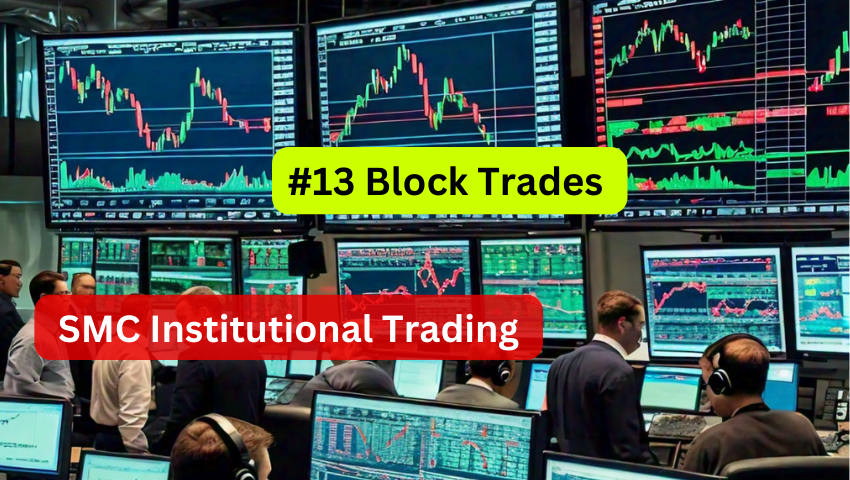


Imagine you're at a bustling market, and a merchant decides to sell a massive shipment of goods all at once. This action can cause quite a stir, influencing prices and the behavior of other merchants. Similarly, in the financial world, institutional block trades can create significant ripples in the market. These large volume orders, often executed by major players like hedge funds and pension funds, can have a profound impact on stock prices, necessitate complex negotiation processes, and require strategies to minimize slippage.
Stocksphi, a leading expert in trading services, excels in navigating the complexities of institutional block trades. Whether you're a trader, investor, learner, technologist, or professional, understanding the mechanics of block trades can enhance your market strategies. This comprehensive guide will delve into the intricacies of block trades, from their execution to their impact on the market, and how Stocksphi’s expertise can help you navigate these waters efficiently.
Institutional block trades refer to large transactions involving a significant number of shares (typically 10,000 shares or more) or large dollar amounts (often $200,000 or more). These trades are conducted by institutional investors such as hedge funds, mutual funds, and pension funds. Unlike regular trades that go through public exchanges, block trades often occur privately, negotiated directly between buyers and sellers to avoid disrupting the market.
The concept of block trading has evolved over the decades, originating from the need for large institutions to buy or sell significant quantities of securities without causing severe price fluctuations. Initially, these trades were facilitated through traditional brokers and floor traders. However, with advancements in technology and the advent of electronic trading platforms, block trading has become more sophisticated and efficient.
The primary participants in institutional block trades are institutional investors, including:
When we talk about large volume orders in the context of block trades, we refer to transactions that involve a significant number of shares or large dollar amounts. Typically, a block trade involves at least 10,000 shares or trades worth $200,000 or more. For major institutional investors, handling such substantial orders requires a nuanced approach to avoid significant market disruption.
Executing large volume orders presents a unique set of challenges. One major hurdle is market impact—the potential to cause significant price movements due to the sheer size of the trade. To mitigate this, traders must carefully strategize on timing and order types to ensure minimal disruption.
Moreover, liquidity can be an issue. Finding a counterparty willing to take the other side of a large trade without demanding substantial price concessions can be difficult. This is where the expertise of platforms like Stocksphi comes into play, offering solutions that help traders execute large orders efficiently.
Various order types are utilized in block trading to manage execution more effectively:
Stocksphi provides tailored solutions, leveraging advanced trading algorithms to determine the optimal order type for each block trade scenario.
Large volume orders can significantly affect stock prices, primarily due to their size relative to typical market activity. When a block trade is executed, it can cause a noticeable price movement, especially if the market is not highly liquid. This market impact is often a key consideration for institutional investors and one of the reasons block trades are often negotiated privately.
Typically, price movements around a block trade follow a pattern:
Consider the case of Warren Buffett's Berkshire Hathaway executing a large block trade to acquire a substantial stake in Apple Inc. This move significantly impacted Apple's stock price, initially causing a spike due to the increased demand and investor confidence stemming from Buffett's endorsement. Similarly, large sell orders by prominent funds can cause substantial price drops, reflecting the market's reaction to the perceived value of the shares being offloaded.
Negotiating prices in block trades involves intricate discussions between the buyer and the seller, often facilitated by brokers or intermediaries. The goal is to agree on a price that reflects the market value while accommodating the trade's size. This process can be complex, requiring thorough analysis and strategic positioning.
Brokers play a crucial role in block trades. They act as intermediaries, helping to match buyers and sellers, negotiate prices, and execute the trade with minimal market impact. Their expertise and market connections are invaluable in ensuring a smooth transaction.
Price discovery in block trades is about finding the equilibrium price where both parties are satisfied. This involves analyzing market conditions, the stock's liquidity, and the potential impact of the trade. Brokers and platforms like Stocksphi use sophisticated tools and algorithms to facilitate this process, ensuring that negotiated prices are fair and reflective of the current market.
Slippage occurs when the executed price of a trade differs from the intended price. In block trading, this can be particularly problematic due to the large size of the orders, leading to significant deviations from the expected price.
To reduce slippage in block trades, several strategies can be employed:
Modern trading relies heavily on technology to minimize slippage. Tools like trading algorithms, dark pools (private exchanges where large trades can be executed without impacting the public market), and sophisticated execution management systems are crucial. Stocksphi leverages these technologies to provide traders with the best possible outcomes, ensuring minimal slippage and optimal execution.
Institutional block trades offer several advantages to investors:
Stocksphi specializes in optimizing these advantages, ensuring institutional clients achieve efficient execution and favorable pricing through advanced trading strategies.
However, institutional block trades come with inherent risks:
Navigating these risks requires careful planning and execution, leveraging expertise and technological tools to minimize adverse outcomes.
Individual investors can benefit from interpreting block trade signals:
By understanding these signals, retail investors can make informed trading decisions aligned with institutional strategies.
Tracking institutional trades involves:
Stocksphi equips retail investors with tools to track and mirror institutional strategies, empowering them to align their investments with market leaders.
Retail investors can leverage technology for insights:
Platforms like Stocksphi integrate advanced technologies to democratize access to institutional-grade insights and tools for individual investors.
Effective risk management strategies include:
Stocksphi provides educational resources and risk management tools tailored to empower retail investors in managing risks associated with institutional block trades.
Optimizing trade timing involves:
By understanding institutional trading patterns and employing strategic timing, retail investors can capitalize on market movements triggered by block trades.
In-depth analysis of specific institutional block trades showcases:
These case studies highlight actionable insights that individual traders can apply to enhance their own trading strategies.
Key takeaways from case studies include:
By learning from institutional experiences, retail investors can refine their trading approaches to achieve better outcomes.
Effective execution of block trades involves:
Adhering to best practices enhances trading efficiency and minimizes risks associated with institutional block trades.
Recommended tools and platforms include:
Platforms endorsed by Stocksphi provide comprehensive solutions for traders seeking to optimize their trading strategies and execution capabilities.
Avoiding pitfalls such as:
Awareness of common mistakes helps traders navigate challenges associated with institutional block trades effectively.
A block trade involves a significantly large number of shares or a substantial dollar amount traded at once, usually negotiated off the open market. In contrast, regular trades are smaller transactions executed on the open market through public exchanges.
Institutional investors employ various strategies such as breaking large orders into smaller trades, utilizing dark pools, and leveraging advanced trading algorithms to minimize market impact.
Regulatory requirements vary by jurisdiction but generally include reporting obligations to ensure transparency and prevent market manipulation.
Understanding block trades allows retail investors to anticipate market movements, mirror institutional strategies, and optimize their trading decisions for better financial outcomes.
Institutional block trades play a pivotal role in financial markets, offering liquidity and efficiency to institutional investors while posing risks such as market impact and regulatory scrutiny. Understanding the dynamics of block trading is essential for both institutional and retail investors aiming to navigate these complexities effectively.
Stocksphi specializes in empowering traders with the knowledge and tools needed to capitalize on institutional block trades responsibly. By staying informed and adopting strategic approaches, investors can enhance their trading capabilities and achieve their financial goals.
Stay updated on block trading strategies and market developments with Stocksphi. Explore our resources and tools to elevate your trading strategies and maximize investment opportunities in the evolving financial landscape.
Insights from industry experts on block trading strategies and market insights:
